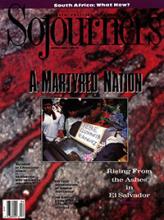THIS YEAR WE COMMEMORATE the 10th anniversary of two tragedies in El Salvador. On March 24, 1980, Archbishop Oscar Romero was gunned down in a San Salvador chapel while saying Mass. Eight months later, four North American church women were brutally murdered. Their fate is one that has been shared in the last decade by 75,000 Salvadorans. Another 7,000 Salvadorans have "disappeared," and 1.5 million have been displaced from their homes by the terror.
The murder last November of six Jesuits, their cook, and her 13-year-old daughter once again riveted the world's attention on El Salvador's ongoing tragedy, making this year's commemorations even more poignant. Their deaths were just one part of an escalating war against the church.
But the people of El Salvador -- "The Savior" -- would ask us, as we remember their tragedy, to remember another reality in their country. They invite us to hear their testimony to hope and life and faith amid terrible suffering. They offer us their story of resurrection.
In what are now perhaps his most remembered words, Archbishop Romero proclaimed shortly before his death that if he were killed, he would rise again in the Salvadoran people. Today a book is being offered by its editors "as proof of that resurrection, revealed in the courage and perseverance of the Salvadoran people."
Read the Full Article

